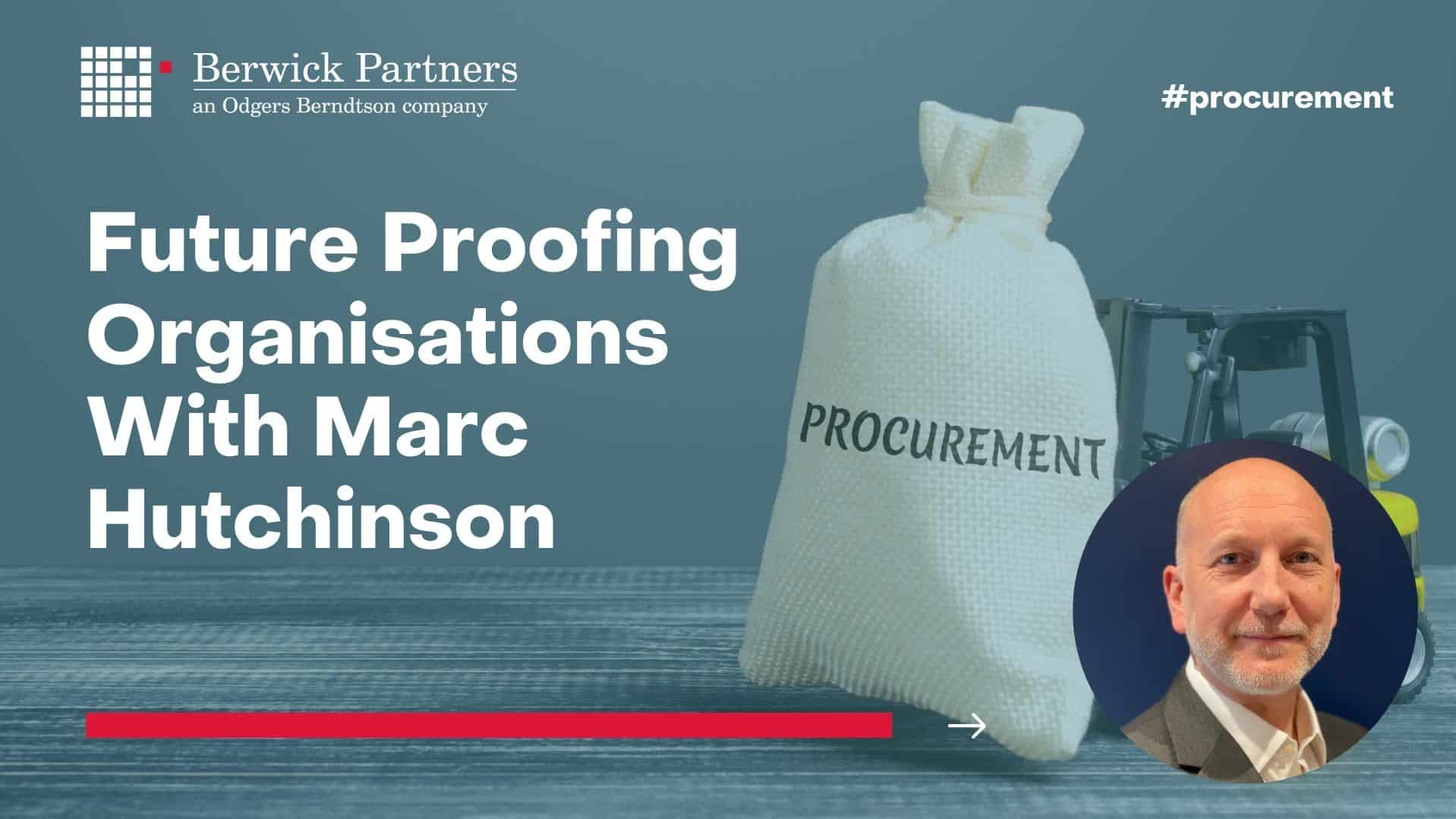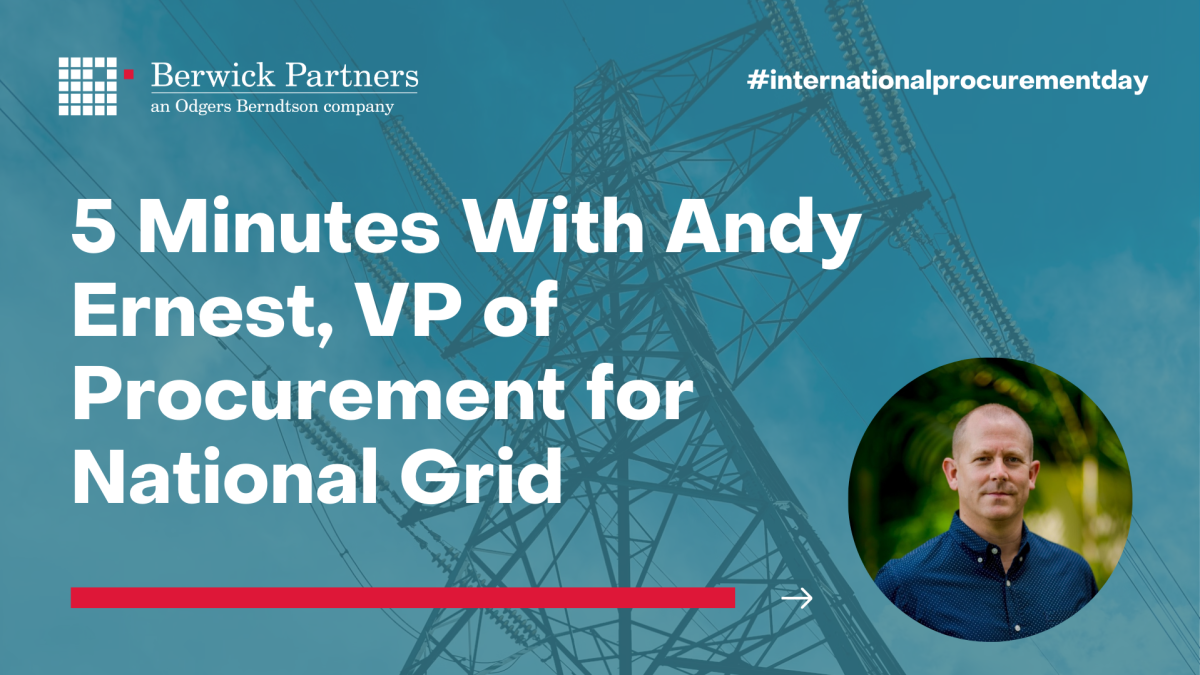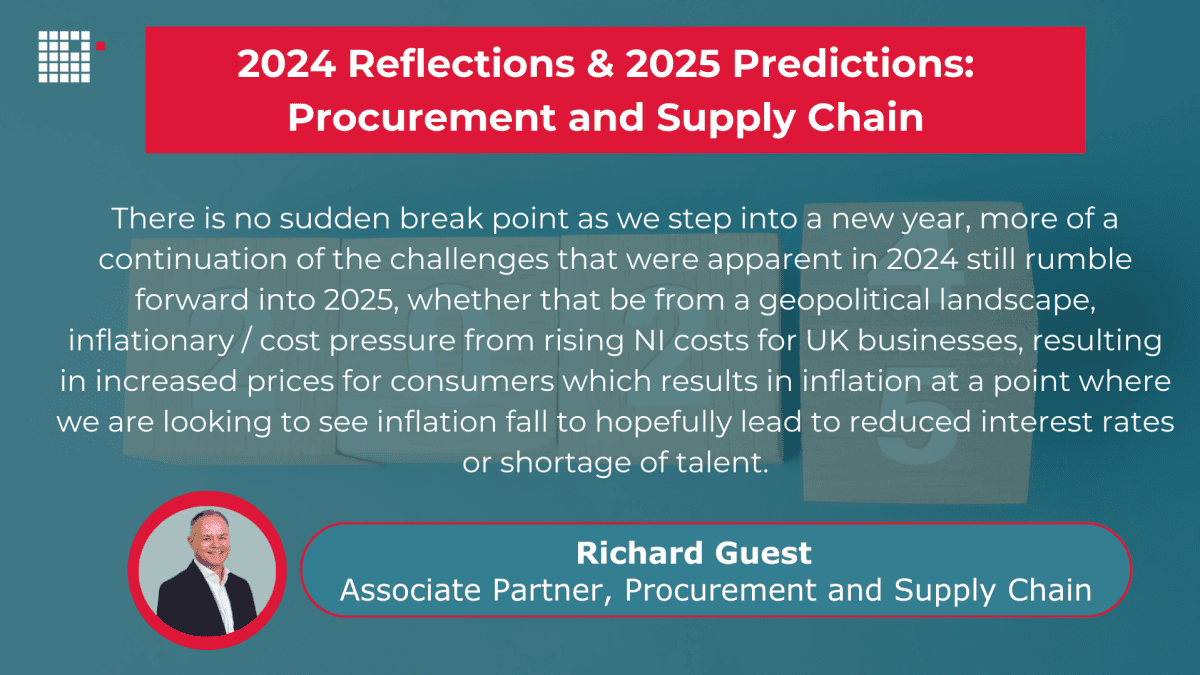Future Proofing Organisations with Marc Hutchinson

I recently had the pleasure of sitting down with Marc Hutchinson to talk through his career, his vision for the future of procurement and discussing what next.
Tell me a bit about your career to date?
After graduating with a degree in Mechanical and Manufacturing Engineering, I joined BAE Systems on their graduate scheme. I initially embarked on several engineering and project management roles before joining a post-merger synergy delivery team. Later, I transitioned into “IT & eBusiness,” where I worked within a team responsible for driving the adoption of eProcurement (eAuctions, eMarketplace, etc.) across the business. This was my first real taste of commercial and procurement, and I became passionate about the profession. I began my procurement career through a corporate CIPS programme at the University of Warwick. Little did I know that 15 years later, I would join the CIPS Board of Trustees and help drive its modernisation across its global footprint in over 160 countries.
I held various commercial, procurement, and supply chain roles at BAE Systems before being headhunted to join the energy sector 10 years ago. Since then, I’ve undertaken global leadership roles at Technip and Baker Hughes. Throughout my career, even during my engineering days, I have been dedicated to driving new ways of working and leading parts of functional or business transformations.
Getting back to the theme of our interview, as a procurement leader and former CPO what are the most important things to future proof procurement organisations.
Firstly I’ll define procurement as managing all risk and opportunity with an organisation’s 3rd party spend – and in some organisations it can also include some internal trading – as there are still many views on procurement, purchasing, sourcing etc.
Organisational success is primarily about people and mindset. Yes, you need fit for purpose processes and technology but success is almost always achieved, or limited, by people. That is not going to fundamentally change in the future through GenAI and ProcureTech although the increased pace of digital transformation means our skills, knowledge and ways of working will also need to evolve, at pace.
What are your thoughts on all the talk around AI & ProcureTech replacing procurement roles?
Of course technology replaces roles, it has done since the Industrial revolution! Even more so in the last 50 years since machine learning was created.
Digital transformation isn’t new. MRP/ERP/eProcurement/Blockchain etc. I was implementing eAuctions over 20 years ago and started implementing RPA & bots in various Purchase to Pay processes around 10 years ago, and there were leading companies doing it before then. Technology has removed repetitive transactional tasks and driven increased efficiency and effectiveness for some time.
The absolute game changer today is the exponential pace of change driven by Generative and Agentic AI. It’s the dot com boom on steroids. Like anything the pace of adoption will vary vastly across organisations, sectors and regions. For some it will be a huge catalyst and for others just the next step on their digital transformation journey. We must remember that some organisations, large and small, have yet to master proper category management and despite block chain being around over 10 years it still has limited widespread global adoption and use cases.
One thing is certain, we’re beyond simply automating repetitive, transactional and analytical activities to drive business efficiency and effectiveness and moving, at pace, to digitally augmented procurement and supply teams where orchestration is key. Some roles will change, others will become obsolete but there will also be new roles and opportunities. The future is exciting and something we should embrace, rather than fear, but we do need a different mindset.
Can you give an example of technology replacing, or augmenting, a traditional procurement role?
Let’s use Category Management as an example. A good category strategy takes an experienced procurement professional, with deep category domain knowledge, quite a few days to research, analyse and compile. Now we can generate something equivalent within a few minutes. So we don’t need the same level of time & resource or the depth of category expertise (which are sometimes “knowledge bottlenecks”) in our teams. However, we do need the right tool/product, effective inputs and prompt engineering skills to generate an effective strategy, sufficient category knowledge to spot any errors or anomalies (AI hallucinations) and the business savvy to decide if the proposed strategy is fit for purpose. Logically it would be easier for an experienced category manager to benefit from the time saving and also have the knowledge to make the right decision. Could they take on more categories? We definitely won’t need all the analytical and research effort so there’s clearly a manpower savings which can be utilised elsewhere. It’s less clear to me how we accelerate the tacit knowledge of early careers colleagues to have them create and interpret an AI generated strategy and make the right decision – until of course the technology matures to a point where it can make the right decision. There’s also a question around how we support early careers training and development given the analytical and transactional activities have traditionally been the foundation blocks for a procurement career. I suspect many organisations will be refreshing their competency frameworks, training and career pathways.
What do you think are the key procurement skills of tomorrow?
Requirements will continually evolve so it will be important to maintain good technical literacy and keep abreast of technology, AI & Automation. and of course some skills will vary depending on the type, and maturity, of organisation or sector in which you work.
In my view, effective soft skills e.g. empathy, rapport, building trust & relationships, influencing etc are needed to support supplier performance and relationship management, dispute resolution, finalising complex negotiations, collaborating and influencing in cross functional teams. Critical thinking, curiosity and problem solving will also remain key. I don’t see any of this being replaced in the next decade or so. I expect specific new skills maturity in technology augmentation, AI prompt engineering and big data.
Earlier you mentioned the need for a “different mindset”. Can you elaborate?
We each need a growth mindset and be open to lifelong learning. CPD shouldn’t stop when you reach a certain age, position, or a achieve a qualification or level of attainment.
We also need to be comfortable with change, or be OK with being uncomfortable!
The recent increase in pace of technology, and change, dictates that our frequency of learning (including unlearning and relearning some of the things we previously understood) will increase and must continue throughout our entire working life (and probably beyond) or we each risk falling behind.
It’s easy for those of us motivated with learning new things, being curious and interested. It’s much tougher if you don’t really enjoy learning, perhaps didn’t enjoy school or undertake further training or qualifications. You’ve been trained to do your job, and are good at it, and complete any company mandated training but that’s about it, no real interest in more learning.
We need more reverse mentoring, more intergenerational learning between digital natives and Gen X and Y. Equally employers need to recognise that CPD is an essential part of the day job for all and not just for those highly motivated employees who take ownership of their careers and are allocated to high potential training programmes or stretch assignments and often complete additional learning in their own time. The organisation is responsible for creating the culture, environment, budget and time to support all employees. In theory this will yield from bottom line efficiencies driven by AI & Procuretech. In practice….. time will tell how much organisations choose to reinvest these benefits in developing their people to optimise augmented talent and technology versus a requirement of ROI and increased profitability.
On a personal note, what’s your next Marc? I understand you’ve been on a sabbatical ?
Haha, sabbatical sounds a little grandiose. I’ve not been writing the Hutchinson memoirs or trekking through Tibet in search of deeper meaning. I’ve simply taken a year out to live life! I’ve done loads of travelling, been invited to, and spoken at, more events & roundtables in the last 12 months than the previous 12 years and also indulged in valuable family time making amazing memories. I think they’re getting a bit sick of me now and asking when I’m going back to work so, yes, I’m now on the lookout to find a new challenge in 2025 where I can continue to add purposeful value to an organisation.
Any final words?
Embrace change and accept it is part of everyday life. Don’t fear AI driven digital transformation but do equip yourself with curiosity and a growth mindset
We hope you enjoyed this article. For further information about the work we do in Procurement please get in touch with Richard Guest.





